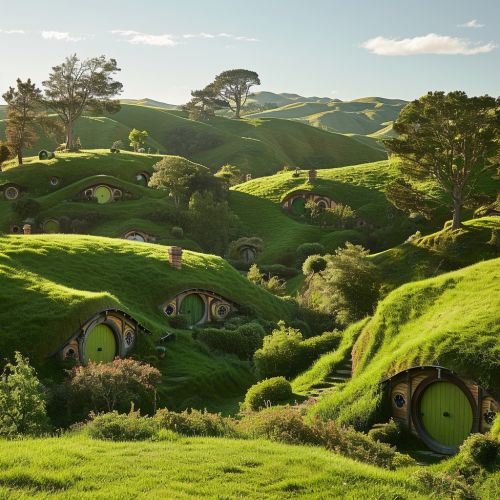The Hobbit (film series)
Overview
"The Hobbit" is a film series based on the 1937 novel of the same name by J.R.R. Tolkien. The series consists of three high-fantasy adventure films directed by Peter Jackson. The films are, in chronological order: "The Hobbit: An Unexpected Journey" (2012), "The Hobbit: The Desolation of Smaug" (2013), and "The Hobbit: The Battle of the Five Armies" (2014). The series acts as a prequel to Jackson's "The Lord of the Rings" film trilogy.


Production
The production of "The Hobbit" film series was a complex and lengthy process that involved a multitude of elements including pre-production, filming, and post-production. The series was produced by New Line Cinema, Metro-Goldwyn-Mayer, and WingNut Films, and distributed by Warner Bros. Pictures.
Pre-production
Pre-production for the series began in 2007, with Guillermo del Toro initially attached to direct. However, due to various delays, del Toro left the project and Peter Jackson took over as director. The screenplay was written by Fran Walsh, Philippa Boyens, Peter Jackson, and Guillermo del Toro.
Filming
Principal photography for all three films was conducted concurrently in New Zealand over a period of 266 days. The films were shot using Red Epic cameras and were some of the first feature films to be shot at a high frame rate of 48 frames per second, a technique that garnered both praise and criticism.
Post-production
Post-production involved a significant amount of computer-generated imagery (CGI) due to the fantastical elements of the story. The visual effects were created by Weta Digital, with the series featuring extensive use of motion capture technology.
Plot
The plot of "The Hobbit" film series follows the journey of the titular hobbit, Bilbo Baggins, who is swept into an epic quest to reclaim the lost Dwarf Kingdom of Erebor from the fearsome dragon Smaug. Alongside a company of thirteen dwarves and the wizard Gandalf the Grey, Bilbo faces numerous dangers and discovers a precious ring tied to the fate of Middle-earth.
Reception
The "Hobbit" film series received mixed to positive reviews from critics. While the visual effects, production design, and performances (particularly those of Martin Freeman as Bilbo and Ian McKellen as Gandalf) were praised, the trilogy was criticized for its lengthy runtime and over-reliance on CGI. The series was a commercial success, grossing over $2.9 billion worldwide.
Legacy
The legacy of "The Hobbit" film series is significant, with the films contributing to the popularization of high frame rate cinema and the advancement of motion capture technology. The series also further established New Zealand as a major destination for film production, particularly for epic fantasy films.
